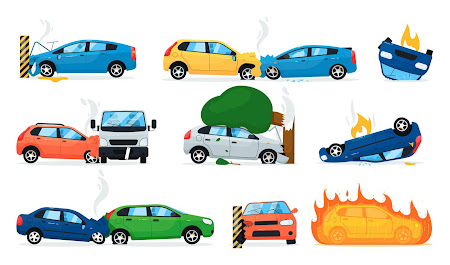Understanding Highway Crashes: Causes, Consequences, and Prevention
Understanding Highway Crashes: Causes, Consequences, and Prevention
Introduction:
Highway crashes continue to be a major concern worldwide, affecting countless lives and causing significant damage to individuals, families, and communities. Understanding the causes, consequences, and prevention measures associated with highway crashes is crucial for promoting road safety and reducing the devastating impact of such incidents. In this article, we will delve into the topic of highway crashes, exploring their primary causes, the consequences they entail, and the steps we can take to prevent them.
Causes of Highway Crashes:
a. Distracted Driving: One of the leading causes of highway crashes is distracted driving, which includes activities like texting, talking on the phone, eating, or engaging with in-vehicle technologies. These distractions take the driver’s attention away from the road, increasing the risk of accidents.
b. Speeding: Driving above the designated speed limit or too fast for the prevailing conditions significantly contributes to highway crashes. Speeding reduces the driver’s ability to react to unexpected situations and increases the severity of accidents.
c. Impaired Driving: Operating a vehicle under the influence of alcohol, drugs, or certain medications impairs judgment, coordination, and reaction time, making impaired driving a significant factor in highway crashes.
d. Reckless Driving: Aggressive behaviours such as tailgating, improper lane changes, and disregarding traffic rules contribute to a high number of accidents on highways.
e. Fatigue: Driver fatigue, often caused by lack of sleep, long working hours, or monotonous driving conditions, can impair alertness and lead to highway crashes.
Consequences of Highway Crashes:
a. Loss of Life: Highway crashes result in tragic loss of life, leaving families and communities devastated by the sudden loss of loved ones. Each life lost is a poignant reminder of the importance of road safety.
b. Physical Injuries: Survivors of highway crashes often sustain severe physical injuries, ranging from minor cuts and bruises to debilitating disabilities. These injuries may require long-term medical treatment, and rehabilitation, and can have a lasting impact on the individual’s quality of life.
c. Emotional and Psychological Impact: Highway crashes not only cause physical harm but also inflict emotional and psychological trauma on victims and their families. The aftermath of an accident may lead to anxiety, depression, post-traumatic stress disorder (PTSD), and other mental health issues.
d. Economic Burden: Highway crashes result in substantial economic costs, including medical expenses, property damage, legal fees, and lost productivity. These costs affect individuals, insurance companies, and society as a whole.
Prevention Measures:
a. Public Awareness Campaigns: Educating the public about the dangers of distracted driving, speeding, impaired driving, and other risky behaviours is crucial. Public awareness campaigns can highlight the importance of responsible driving and promote safer practices.
b. Strict Enforcement of Traffic Laws: Effective law enforcement plays a pivotal role in preventing highway crashes. Strict penalties for traffic violations, increased patrols, and the use of speed cameras can act as deterrents and encourage compliance with traffic regulations.
c. Improved Infrastructure: Enhancing road infrastructure through measures such as better signage, proper lighting, and the implementation of safety features like guardrails and rumble strips can help reduce the risk of accidents.
d. Driver Education and Training: Comprehensive driver education programs, including defensive driving techniques and awareness of the dangers associated with impaired and distracted driving, are essential in equipping motorists with the necessary skills and knowledge to make safe choices on the road.
e. Technological Advancements: The development and implementation of advanced safety technologies in vehicles, such as collision warning systems, automatic emergency braking, and lane departure warning systems, can assist drivers in avoiding crashes and mitigating their consequences.
Conclusion:
Highway crashes are tragic events that result in loss of life, physical injuries, emotional trauma, and significant economic burdens. By understanding the causes of highway crashes and implementing effective prevention measures, we can work towards creating safer road environments.
Through public awareness, stricter enforcement, improved infrastructure, driver education, and technological advancements, we can reduce the occurrence of highway crashes, safeguard lives, and promote a culture of responsible driving. Let us strive collectively to make our highways safer for all.
876newsja.COM HAS RECENTLY REMOVE THE GRAPHIC VIDEO BECAUSE OF GOOGLE’S COMMUNITY GUIDELINES.
JOIN OUR——>>>Telegram Group<<<——TO SEE ALL THE VIDEOS.
![]()
